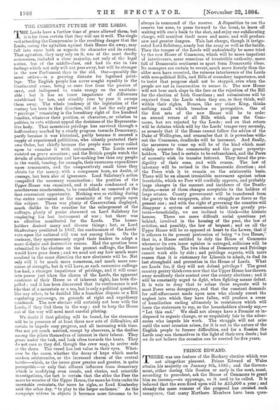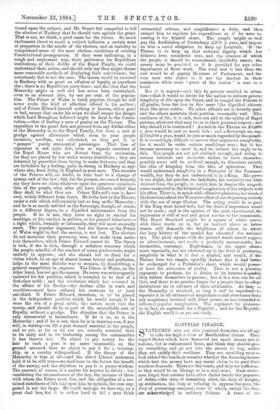PRINCE EDWARD. T HERE was one feature of the Hackney election
which was not altogether pleasant. Prince Edward of Wales attains his majority on January 8th, 1885; and the Govern- ment, either during this Session or early in the next, must, according to precedent, ask the House of Commons to grant him an income,—an appanage, as it used to be called. It is believed that the sum fixed upon will be .t15,000 a year ; and already the mere rumour of the proposal has created such annoyance, that many Northern Members have been quess
tioned upon the subject, and Mr. Stuart felt compelled to tell the electors of Hackney that he should vote against the grant. That is not, we think, a good omen for the future. So much excitemdnt about so small a subject indicates a certain want of proportion in the minds of the electors, and an inability to comprehend some of the most obvious conditions of existing • Constitutional arrangements. If they were indicating, in a rough and unpleasant way, their preference for Republican institutions, or their dislike of the Royal Family, we could understand their action, and should only say they might choose more reasonable methods of displaying their convictions ; but notoriously this is not the case. The Queen would be received in Hackney with as great an effusion of loyalty as anywhere else ; there is no Republican party there; and the idea that the Monarchy might as well end has never been entertained, even as an abstract idea, by one per cent, of the popula- tion. The Prince of Wales is fairly popular, though he will never evoke the kind of affection offered to his mother ; and of Prince Edward himself nothing is known, either good or bad, except that under his reign we shall escape the danger which Lord Brougham believed might be fatal to the Consti- tution,—that of finding a man of genius on the Throne. The opposition to the grant does not proceed from any dislike either to the Monarchy or to the Royal Family, but from a sort of grudge against allowances which seem to poor people excessive, needless, and calculated, as they put it, to " pamper " purely ornamental personages. That line of argument is not quite fair, even as regards members of the Royal House who are distant from the succession, for they are placed by law under serious disabilities ; they are --debarred by precedent from trying to make fortunes, and they - are forbidden by a feeling, quite as strong in Hackney as any- where else, from living in England as poor men. The number of the Princes will, no doubt, in time lead to a change of system and of the law ; but, for the present, we cannot honestly say they have no claim whatever upon the generous considera- tion of the people, who, after all, have hitherto willed that • they shall be what they are. Prince Edward's case is, how- ever, widely different from theirs. He is the heir to the Throne,
• under a rule which will certainly last as long as the Monarchy ; and he is as much entitled as the Sovereign, though, of course, in a different degree, to a dignified maintenance from the people. If he is not, they have no right to control his marriage, or his conduct in politics, or his general behaviour- s right which, formally or informally, they will most assuredly exert. The popular argument, that the Queen or the Prince of Wales ought to find the money, is not just. The electors do not maintain their grown-up sons, but make them main- tain themselves, which Prince Edward cannot do. The Queen is rich, if she is rich, through a sedulous economy which the people, mindful of the conduct of many predecessors, ought entirely to approve ; and she should not be fined for a virtue which, in an age of almost insane luxury and profusion, helps in the most definite way to restrain, by discrediting, a general competition in, expense. The Prince of Wales, on the other hand, has not got the money. He never was extravagantly endowed for his position, which is intended to be that of a first-class noble ; and the revolution which has occurred in the affairs of his Duchy—the decline alike in rents and royalties—must have reduced his revenues by at least one-third. If Prince Edward, therefore, is to be placed in the independent position which he would occupy if he were the son of a great noble, the nation must vote the money, and should do it, as part of the unavoidable cost of Royalty, without a grudge. The objection that the Prince is only ornamental is inconsistent. If he is so, so is the Monarchy ; and if he is not, then he is in training—or, if you -will, in waiting—to fill a post deemed essential to the people, and as yet, so far as we can see, actually essential both to its unity and to its leadership among the communities it has thrown out. To object to pay money for the heir to such a post is no more reasonable, on the ground assumed, than to object to pay it for a training- ship or a cavalry riding-school. If the theory of the Monarchy is true at all—and the ablest Liberal statesmen hold it to be still true—we shall have in the future the benefit of the money, and the objection to pay it is penny-wisdom. The amount, of course, is a matter for experts to decide ; but considering the circumstances of the day, the incomes of those with whom the Prince must live, and the obligation of a sus- tained stateliness of life laid upon him by opinion, the sum sug- gested is not too large. He could manage, we dare say, on a great deal less, but it is rather hard to bid a man think ceremonial solemn, and magnificence a duty, and then compel him to regulate his expenditure as if he were in- curring it for himself alone. The people might its weal pay the Archbishop of Canterbury £200 a year, and impose on him a social obligation to keep up Lambeth. If the Throne is to keep up that external dignity which has hitherto been considered wise, and the absence of which the people, it should be remembered, decidedly resent, .the money must be provided as it is provided for any other department of State work. The total cost is less than the cost would be of paying Members of Parliament, and the very men who object to it are the hardest in their comments when some "guest of the nation" is sent to ,a hotel.
But it is argued—and this by persons entitled to atten- tion—that it would be better for the nation to enforce greater simplicity of life upon the Court, and to compel the Princes of all grades, from the first to live more like dignified citizens than like great nobles. No other officials are so heavily paid. and the others maintain their position reasonably well. "This costliness of life, it is said, does not add to the utility of Royal persons, whatever that may be, or to their personal respect ; and why should it be continued ? An heir to the Throne on f...5,000 a year would be just as much heir ; and a Sovereign on, say, £100,000 a year, would be just as much regarded by the people. It is exceedingly difficult to answer that argument completely, for it would be under certain conditions true ; but it' has become necessary to meet it, and we believe the reply toebe this. The people are not yet civilised enough, and owing to certain inherent and incurable foibles in their character, possibly never will be civilised enough, to dissociate entirely the idea of kingship from the idea of splendour. They would understand simplicity in a Protector of the Common- wealth, but they do not understand it in a King. His power is too slight, his position too indefinite, his authority too little derived from the people, to enable him to despise the magnifi- cence connected in the historical imagination of his subjects with his office. There is, to speak with offensive plainness, too much of the histrionic about the Throne to allow of our dispensing entirely with the use of stage illusion. The acting would be as good if the King wore broadcloth, but the desired impression would not be made ; and in the opinion of the most experienced, the impression is still of real and great service to the community. The Royal Standard might be a square of white eaavas with those words on it, but an instinct above or below reason still demands the brightness of colour to which the long history of the symbol has educated the national eye. The plain square with the printed words would suggest an advertisement, and excite a perfectly unreasonable, but irresistible, contempt. Englishmen, in the upper classes more especially, are not educated up to the level of preferring simplicity in what is in fact a symbol, and would, if the Throne were too simple, speedily declare that it had better be exchanged for a Protector's chair, which would possess at least the attraction of reality. That is not a pleasing argument to produce, for it denies to its hearers &quality they believe themselves to possess ; but it is a true one.for all that, and there is no greater danger for a people than toaflopt institutions far in advance of their civilisation. As dong as the Monarchy is retained, so long it will be expedient.to separate it in all externals of magnificence and observancd from any magistracy invested with direct power, or less intendettto influence popular imagination. The argument for plainness is, in fact, an argument for a Republic ; and for tho Republie the English world is as yet not ready.



































 Previous page
Previous page